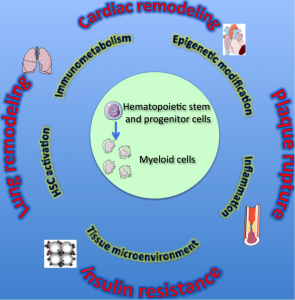Research
Cardiovascular disease is the leading cause of death in developed countries. Inflammation aggravates outcome of cardiovascular disease including atherosclerosis and infarct healing after myocardial infarction (MI) (Leuschner* and Dutta* et al., Nature Biotechnology, 2011). During progression of atherosclerosis, myeloid cells destabilize lipid-rich plaques in the arterial wall and cause their rupture, thus triggering myocardial infarction and stroke. Survivors of acute coronary syndromes have a high risk of recurrent events for unknown reasons. We showed that the systemic response to ischemic injury aggravates chronic atherosclerosis (Dutta et al., Nature, 2012). After myocardial infarction or stroke, ApoE-/- mice developed larger atherosclerotic lesions with a more advanced morphology and inflammation. This disease acceleration persisted over many weeks and was associated with markedly increased monocyte recruitment.
One of our current research interests focuses on immunology of cardiovascular disease. We are investigating how myeloid cells, such as monocytes and macrophages, induce inflammation in metabolic disease such as type II diabetes and cardiovascular disease such as myocardial infarction. The ultimate goal of the lab is to develop potential therapeutic avenues to check generation of myeloid cells in the bone marrow and spleen, and recruitment of myeloid cells to sites of inflammation such as adipose tissue and the myocardium. We are also keenly interested to investigate differential functions of tissue resident and monocyte-derived macrophages in steady state and disease.

